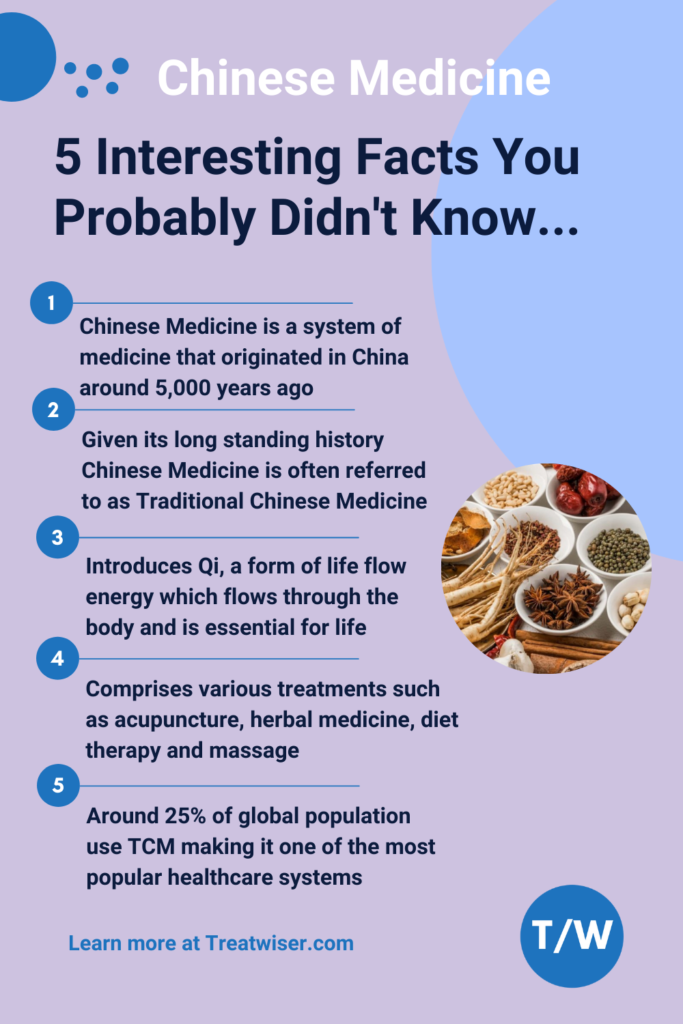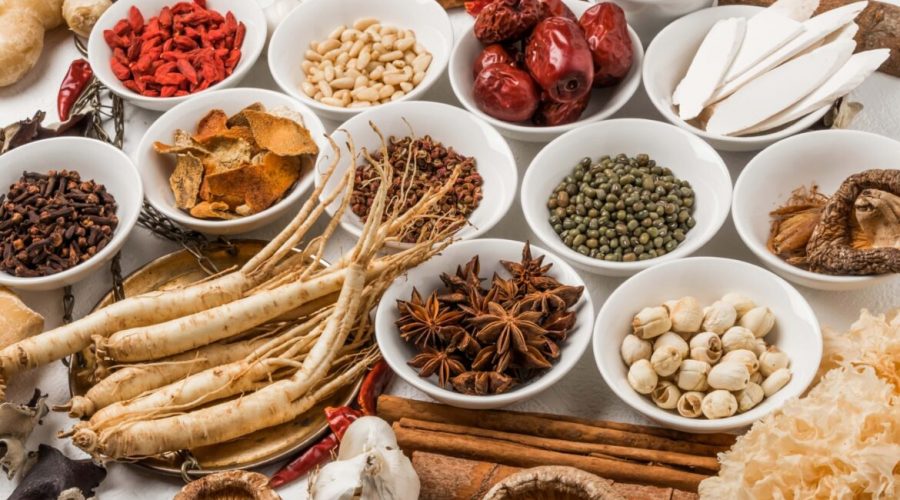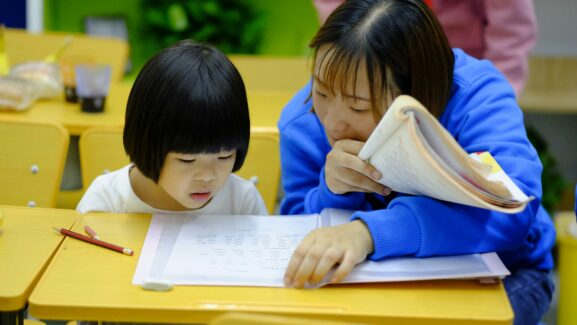Traditional Chinese Medicine or TCM is one of the world’s oldest complete systems of holistic healthcare originating in China around 5,000 years ago. TCM comprises various types of treatments such as acupuncture, herbal medicine, diet therapy and massage.
Around one quarter of the world’s population use TCM making it one of the most popular healthcare systems in the world. Evidence also suggests that it may help with a large array of conditions ranging from chronic degenerative diseases to diabetes to childhood ailments.
This page will explore the fundamental concepts of this ancient Chinese healing system, the science behind its effectiveness, what you might expect from TCM treatments, as well as how to start your TCM journey.
Table of contents
- 5 interesting facts about traditional Chinese medicine
- What is traditional Chinese medicine?
- What is the theory behind traditional Chinese medicine?
- When and how is traditional Chinese medicine used?
- What is the evidence to support traditional Chinese medicine?
- What can I expect as a traditional Chinese medicine patient?
5 interesting facts about traditional Chinese medicine

What is traditional Chinese medicine?
Traditional Chinese medicine is system of medicine which focuses on holistic wellbeing by restoring natural harmony
What is TCM? Similar to other holistic systems of medicine, TCM’s focus is on restoring balance and natural harmony in an individual rather than a specific ailment. It does this through precepts such as Yin and Yang as well as qi (pronounced chee), or life flow energy.
Yin and Yang derive from ancient Chinese philosophy and suggest that all things in the natural world are inseparable, interconnected and contradictory opposites: fire-water, female-male, dark-light, young-old, and this same belief goes for balancing one’s health.
TCM’s focus is on restoring the body’s relative and natural equilibrium of life flow energy, or qi energy to maintain a healthy flow of the body’s energy and therefore, stimulate good health.
TCM is preventative in nature, focusing on educating the patient about a lifestyle that fosters a balanced diet, exercise plan, stress relief techniques, pain management, good living habit, as well as highlighting the importance for rest and relaxation practices on a regular basis.
Traditional Chinese medicine has a 5,000 year history
TCM as a system of medicine has been practiced for at least 5,000 years, with the earliest known written records, the Huangdi neijing, written in the 3rd century BCE.
This is a system that has been continually evolving through the millions of Chinese practitioners with principles that have been refined and improved after treating billions of patients.
What is the theory behind traditional Chinese medicine?
Traditional Chinese medicine’s focus is on the relative equilibrium of Yin and Yang
To achieve a healthy relative balance in the body means constantly managing the Yin and Yang of the body. A concept that describes the interdependence and relationships of opposites in the body.
Yin and Yang is a great analogy. It helps better understand disease and disorders in the body through the relationship of cause and effect.
Yin relates to the body’s exterior including skin and hair, whereas yang relates to the interior.
Yin relates to deficiency or xu whereas yang relates to excess or shi
Finally, Yin relates to cold, whilst Yang relates to heat.
Both Yin and Yang undergo constant change. If the relative equilibrium of Yin and Yang is broken, then illness may occur.
A good example is that excess Yang which is related to heat, may lead to illnesses such as insomnia and dry mouth. On the other hand, a Yang deficiency may cause cold-limbs or sleepy.
Vital life energy or Qi is an underlying principle behind TCM
Qi in Chinese medicine is a form of life flow energy, flows through the body and is essential for life.
This energy follows pathways through the body called meridians. Meridians are distributed through the internal organs.
Optimum health is achieved when there is an abundance of healthy Qi flowing smoothly through the meridians, creating a harmonious synergy of bodily functions. On the contrary, illness occurs when there are blockages of Qi or stagnant energy in the body and treatments will focus on certain meridians to heal the channels of blocked energies.
Chinese five phase theory believes in interrelationship between pairs of organs
The interrelationship between organs is another important concept in TCM theory.
Ten organs are placed into one of five categories of elements: fire, earth, metal, water and wind.
The organs are also split into two groups of yin or yang organs. Yin organs are more substantial and solid (e.g., heart), whereas yang organs are less substantial and hollow (e.g., intestines).
| Element | Yin organ | Yang organ |
| Fire | Heart | Small intestine |
| Earth | Spleen | Stomach |
| Metal | Lungs | Large intestine |
| Water | Kidney | Bladder |
| Wind | Livers | Gallbladder |
The theory goes that every organ paired under an element either improves or inhibits the functioning of the other organ. A good analogy way to how the elements interact with each other.
When and how is TCM applied?
Patients seek TCM for a broad range of reasons
With its holistic approach, the TCM medicine system is used for multiple issues simultaneously, one of various benefits of Chinese medicine. Overall, it aims to address relative imbalance in the body that manifest as many different conditions.
Patients commonly seek out Chinese medicine for the following reasons, however more research may be required to support its efficacy from a Western perspective, and you should always speak to your GP or qualified medical practitioner before booking any appointments:
- Skin conditions, including eczema, acne, and psoriasis
- Digestive issues, including irritable bowel syndrome, constipation, and ulcerative colitis
- Hormonal and reproductive concerns
- Chronic fatigue and tiredness
- Respiratory problems, including Asthma, bronchitis, and chronic coughing
- Pain management, including Osteoarthritis and rheumatoid arthritis
- Urinary conditions
- Psychological conditions, including depression and anxiety
- Other studies suggest TCM can assist those suffering from cancer, relieving symptoms as well as side effects from conventional medications
Traditional Chinese medicine uses a range of treatment and techniques to provide holistic healing
The key Chinese therapies and techniques include:
- Acupuncture is perhaps one of the commonly known branches of TCM. It stimulates the meridians via acu-points which are spread out around the body. Very fine needles are inserted into these various points on the body to open up these channels of energy and help to restore a free flow of ‘Qi’ in the body.
- Acupressure follows a similar approach to acupuncture but uses pressure instead of needles
- Cupping therapy involves application of bell-shaped cups on the body to stimulate the flow of Qi energy and encourage healing. They may target acupoints on the back, abdomen, chest, and thighs.
- Moxibustion is the less common practice of burning a “moxa” stick – made from dried artemisia leaves – to create a thick smoke with an earthy aroma. Such actions are believed to improve health and wellness by stimulating blood circulation and the free flow of vital Qi energy around the body.
- Chinese Herbal Medicine is also seeing higher adoption in clinical practice in the UK and is a widely accepted form of TCM. It involves the use of natural plants and minerals and even some animal products for various diseases by rectifying the over-activity or under-activity of Yin and Yang in the body.
- Diet therapy is the most basic element of TCM which identifies the therapeutic properties of foods and drinks including Chinese tea. It develops a diet that corrects relative imbalances. The Alternative Medicine Guide suggests that most patients experience up to 50% relief of their medical problems just by making dietary changes alone!
- Tui Na is a form of therapeutic Chinese massage which uses similar pressure points to acupuncture to stimulate the meridian system. Tui Na is used for musculoskeletal conditions and some internal diseases such as abdominal and digestive disorders and so on.
What is the evidence to support traditional Chinese medicine?
So how effective is TCM? If the fact that it is used regularly by one quarter of the world’s population is not enough, an increasing number of scientific and clinical studies have verified its efficacy with some mixed results. Although it has taken modern science a while to catch up with these ancient Chinese healing traditions, we are now even seeing some conventional doctors endorsing TCM and herbal alternatives.
Examples of TCM treatments verified by research and trials include:
- Ginseng which as an antioxidant helps to boost the immune system and stave off disease and illness (1)
- Ginger which may reduce migraines without the potent side-effects seen in common drugs (1)
- Hawthorn berries which may reduce indigestion and heartburn (1)
- Goji berries, another antioxidant which is rich in vitamin A, vitamin C and fibres may help control the release of sugar into the blood, providing better balance to the insulin and glucose levels (1)
What can I expect as a TCM patient?
The Traditional Chinese medicine consultation
Upon your first consultation your therapist / practitioner will likely ask questions about your lifestyle, diet and medical history. He or she will look for patterns in the details of clinical diagnostic methods during your first appointment to determine areas of disharmony in your body. Chinese medicine diagnosis is far less invasive than traditional forms of Western medicine and might include:
- Observation of complexion, general demeanour, body language and tongue
- Measurement of pulse at the radial arteries, as well as physical examination of Chinese meridians
- Auscultation (listening to patient’s voice, respiration, coughing) and olfaction (detecting body odor)
Once the examination is complete, they will develop a customised treatment plan which may include herbal Chinese remedies designed to stimulate the flow of energy inside your body and bring about better balance.

How do I find a traditional Chinese medicine professional and what qualifications should they have?
The best place to start the hunt for a reputable TCM therapist / practitioner is with professional bodies which in the UK include:
- Association of Traditional Chinese Medicines
- Chinese Acupuncture and Herbal Medicine Alliance
- Register of Chinese Herbal Medicine
- The Acupuncture Society
- The Unified Register of Herbal Practitioners
Given there is no law in the UK that states individuals must be qualified in order to practice Chinese medicine, these organisations require each individual to comply with certain requirements and regulations.
To satisfy these requirements requires a higher level of training, education and a certain level of professional experience, ensuring you will ultimately receive a far superior level of care and treatment.
You can also use Treatwiser’s directory to find a traditional Chinese medicine therapist near me. Use the search features to narrow your search by location, professional body membership status, and more.
How much will it cost?
The cost of your treatment and the prescriptions varies depending on location and the experience of your therapist / practitioner. First consultations will typically cost from £30-80 with reduced prices for follow-up appointments.
If your treatment involves herbal medicine then this may vary quite substantially from £10-120 per week.
Some therapists / practitioners may bundle the consultation fees and price of herbal medicine together, making them initially appear more expensive – although this is not necessarily the case.
We recommend that you discuss prices in detail upfront with your therapist / practitioner so you know what to expect.
How many appointments will I need and over what period?
The number of appointments will likely vary depending on your individual circumstances. The more serious or chronic your condition, the more sessions may be required.
What are the risks from Chinese traditional medicines?
Although most treatments and techniques including acupuncture and massage are generally safe, greater attention needs to be paid to treatments that involve herbal medicines.
Some medical herbs in Chinese medicine may interact with each other or with other medication you are taking or contain harmful substances if not from a quality registered source.
To minimise risks, it is important to follow the below recommendations:
- Only purchase from sources such as an TCM Therapist / Practitioner where the origins of the herbs are known and can be traced back to source.
- Always consult your TCM Therapist / Practitioner and GP or medical doctor before taking any herbal medicine.
Resources and further TCM information
(1) https://theculturetrip.com/asia/china/articles/11-chinese-tcm-ingredients-scientifically-proven-to-improve-your-health/
DISCLAIMER: The Site cannot and does not contain medical / health advice. The medical / health information is provided for general informational and educational purposes only and is not a substitute for professional advice. Accordingly, before seeking any form of medical advice, diagnoses or treatment based upon such information, we encourage you to consult with your GP or other qualified health practitioner. You must never disregard professional medical advice or delay in seeking it because of something mentioned on this Site. The use or reliance of any information contained on the site is solely at your own risk.



